In the realm of celebrities, where actors and filmmakers take center stage, there exists a hidden gem—a woman named Jennifer Lash, affectionately known as Jini. While her name may not be widely recognized, her impact as a celebrated novelist and devoted mother is nothing short of remarkable. Eight novels, an endless number of paintings and photographs and a unique approach to motherhood – this all was Jennifer Lash. This and much more.
She paved the way for her children—actors Ralph and Joseph Fiennes, filmmakers Martha and Sophie Fiennes, composer Magnus Fiennes, conservationist Jacob Fiennes and (foster child) archeologist Michael —leaving an indelible mark on their lives and the world around them.
Breakthrough Artist and Young Wife
Jini’s journey as a writer began at a young age. When she was only 23, she published her first novel, “The Burial.” Jini’s novel became an immediate hit, captivating readers with its exploration of the intricate dynamics of parenthood and the never ending battle of good and evil. These themes would continue to fascinate her throughout her writing and painting career.
She first met her future husband, Mark Fiennes, in 1961. Mark himself was a talented photographer and illustrator, also known for his architectural studies. His work was highly sought after, and he even received commissions from prestigious institutions like the National Gallery of Art in Washington, D.C.
On their second encounter, Jini boldly told her date: „I am going to have six children.” The young woman would often sketch little drawings of how she imagined her future children, using any available surface, from scraps of paper to the back of envelopes. Mark says he had been immediately smitten by Jini’s personality and creativity, and soon he gave in: „Six seemed like a great number”.
The Fiennes Household: An Unconventional Mother
By the time Jini and Mark were married, she had already published her second novel “The Climate of Belief”. With the birth of their first child, Ralph Fiennes, Jini shifted her focus to painting and drawing, pausing her literary pursuits until the arrival of their sixth child. This creative environment at home, infused with a bohemian spirit, had a profound impact on their children, shaping their artistic inclinations and nurturing their individual talents.
Jini was an unconventional mother in many ways. She actively discouraged her children from pursuing higher education, believing that academic knowledge could potentially rob kids of the rich experiences and practical wisdom that life had to offer. Sophie Fiennes reminisces about their mother’s insistence „By the time you graduate, you will be so dumbed down, you won’t be able to tell what a cabbage looks like.” – her mother used to say.
Jini often shared intricate fables and complex stories with her children, treating them as little adults. She would paint and draw vivid illustrations to accompany these tales, ensuring that her children could better understand, follow, and remember them.
One of Jini’s final works, “Blood Ties,” delves into the multigenerational saga of a single family in the Irish countryside. This captivating novel challenges the notion that blood relations automatically guarantee love. Jini fearlessly tackles the theme of parents losing their ability to love and care for their children, shining a light on the far-reaching damage inflicted on future generations. Through the narrative, the focus shifts to a young child named Spencer, abandoned by his parents and raised by his grandmother’s devoted housekeeper, Mora.
”If a person is not loved, not accepted for himself, then as night follows day, sooner or later he transforms and becomes different. Sometimes, completely different.”
Blood Ties
Jini’s profound love extended beyond her biological children. She welcomed a troubled teenage boy, Michael, into their home in Suffolk. Jini nurtured and cared for Michael with the same dedication as her own children, they were not his foster family, they were his family. Michael reflects on her love and compassion, stating, “Love is compassion, is being aware of people. That is what she tried to teach me. And in the end, I think I got there.”

Nomadic Lifestyle and Homeschooling
The Fiennes family moved frequently, buying and selling houses for 15 years before settling in the West of Ireland. This move was not only driven by financial considerations but also a desire to escape the pressures of city life and find peace in the country. In Ireland, Jini joined her husband in photography, and the duo started capturing the evolving landscapes and the vibrant lives of the local Roma people. The couple were selling those photographs as postcards. The postcards would often feature hands. Jini was fascinated by the stories hands could tell, that of hardworking farmers, bakers, and children clinging to their parents’ fingers.
In 1973, the family embarked on a unique project—building their own home in West Cork. Living in temporary accommodations with other families, Jini took charge of her children’s education. She transformed the construction process into a hands-on learning experience, teaching them about proportions, mathematics, and the local community.
The kids had daily tasks to do based on their age. Sometimes they would observe creatures and rocks on the riverside or neighbors feeding and taking care of animals. Jini instilled in her children a spirit of observation and determination, teaching them that if they truly wanted something in life, they should go after it with all their hearts. “Gotta get your guts into that,” often she would say.
Jini’s motherhood went beyond the realm of the ethereal and artistic. While she nurtured her children’s creative spirits, she also embraced the practicalities of daily life. Washing, scrubbing, filling buckets, and raising animals were all part of the gritty domestic rituals that interconnected with the joys of having a family. She saw motherhood and creating a safe, clean home as her true missions.
Troubled Upbringing and Transcending the Shadows
Jini’s own upbringing was marred by a lack of motherly love and emotional distance from her parents. Raised by Henry Alleyne Lash, royal cavalry brigadier, and the daughter of a high-ranking member of the Indian civil service, Joan Mary Moore, her childhood was marked by a disconnect and an inability to show affection. As Jini later recalled, her mother would rarely kiss her on the cheek since she was afraid her lipstick would have got smeared.
Jini’s intense and emotional nature clashed with her mother’s reticence, who feared the specter of mental illness that plagued her own mother. Jini later remembered seeing her grandmother run naked into the living room throwing tantrums, and being institutionalized a number of times.
Consequently, as a teenager, Jini struggled to find her place. After WWII her family returned to England where she saw her spirited father lose his will to live. He poured the last drops of his energy into giving orders to her family like a tyrant does and trying to keep up their long-gone appearances.
All this led to Jini’s departure from home at the age of sixteen. Soon after leaving, she had a nervous breakdown. A few weeks later, with the guidance of her beloved uncle, a Benedictine monk, the young girl embarked on a journey of healing. He sent Jini to a seaside village and got her a job as a nanny. It was during this time that Jini’s employer, Iris, recognized her talent and encouraged her to write. This is how her first novel “The Burial” was born.
Jini’s own experiences as a mother helped her find solace too. She became the mother she had always yearned for, pouring her love and creativity into her own children and fostering hope and possibility in each of them. Her profound understanding of human nature and wounded children, born from her own troubled past, shaped her exceptional abilities as a storyteller.
Later Life and the Calvary of “Blood Ties”
As the demands of motherhood and creativity weighed heavily on Jini, she often found herself overwhelmed and longing for space and solitude. Her immense love for her children, coupled with the desire to explore her own artistic path, sometimes clashed, and made her battle with her own temper. By the time all her children left home and she could have dedicated more time to her treasured books and paintings, she had to face medical troubles.
In the late 1980s, Jini was diagnosed with breast cancer. However, she continued to write and the disease led her to dive into the world of spirituality. Seeking solace beyond the confines of Christianity, commissioned to write a book on spiritual places, she embarked on a pilgrimage across Europe, visiting ancient and medieval places of spiritual significance. From her visits to French monasteries to her time in Santiago de Compostela, she was seeking a deeper connection with God as well as discovering Buddhism.
„One is always looking. Perhaps finding is simply looking further. ‘Looking’ is life. Maybe pilgrimage puts that ‘looking’ into keener focus.”
On Pilgrimage
Her final novel, “Blood Ties,” was finished before her first operation and faced rejection from her publisher upon her return from Europe. Disheartened, the rejection made Jini feel as if she had, no place in the world as an author. Despite her numerous attempts, her publishers remained reluctant to talk more about the book.
Unfortunately, “Blood Ties” remained unpublished at the time of Jini’s passing in 1993. However, the novel’s luck changed when Ralph met novelist Michael Ondaatje on the set of the cult film “The English Patient,”. Ralph told the celebrated writer about „Blood Ties” who immediately recognized the story’s profound themes, rooted in Jini’s personal experiences. Michael sent the manuscript to Liz Calder from Bloomsbury Publishing. ”I literally burst into tears” said Calder about her ecstatic experience reading the last chapters of the book.
This is how “Blood Ties” was finally published in 1997, a book of pain, hope and love. Written by a woman, a mother, a wife, an artist who was simply unable to not love.
Jini tried to make up with her parents until their very last days, stating „I forgive and understand them. Besides, my children need their grandparents.”
~ by Dora Endre ~

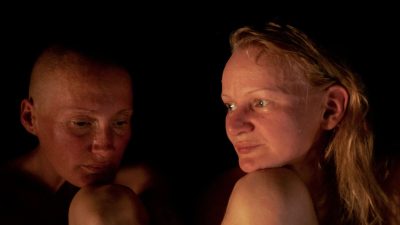
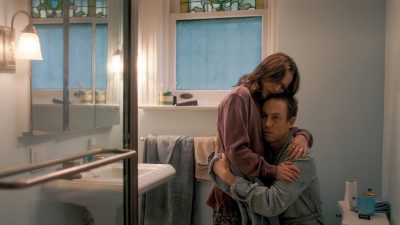

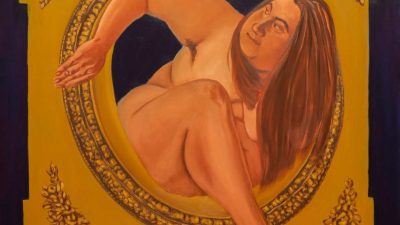
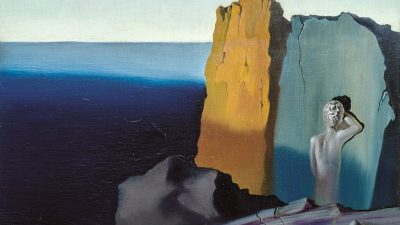



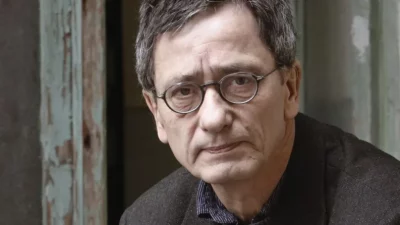




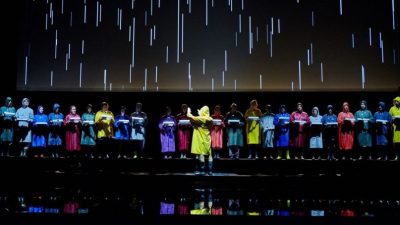


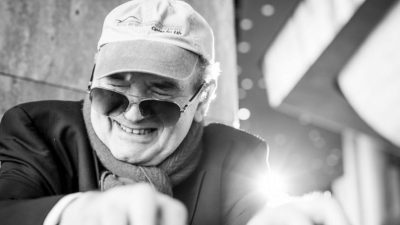


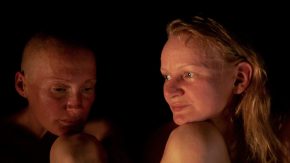




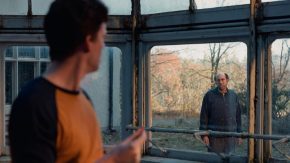
Comments